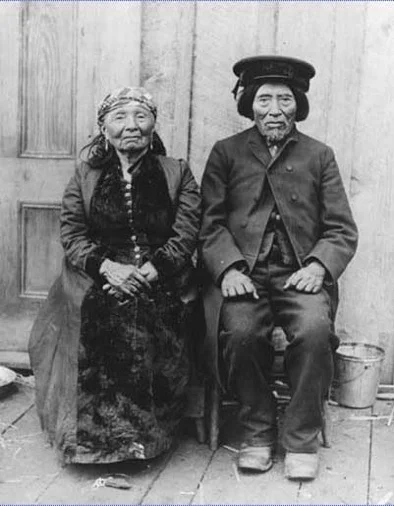Chesheeahud
Chesheeahud was a renowned Duwamish chief and travel guide to Lake Union, Lake Washington, and Lake Sammamish in the days before roads were built in the City of Seattle and its suburbs of the “Eastside”. Chesheeahud was the leader of a Duwamish village on Lake Union. Chesheeahud had a cabin and a potato patch on land given to him by pioneer David Denny at the foot of Shelby Street as late as 1900.
Duwamish people living in villages along the shores of Lake Washington were collectively known as hah-choo-AHBSH, that is, people of HAH-choo (meaning 'a large lake', referring to present-day Lake Washington.) Chesheeahud’s village was named hehs-KWEE-kweel ('Skate'), and was located at Edgewater Park near the point at the south edge of the mouth of Union Bay onto Lake Washington. One longhouse there may have been used as a potlatch house. This village was occupied by the influential group known as hloo-weelh-AHBSH who took their name from the s’hloo-WEELH (literally, "a tiny hole drilled to measure the thickness of a canoe"), the narrow passage through the resource-rich Union Bay marsh.
The Duwamish in this area had a portage from Lake Washington to Lake Union called Skhwacugwit ("portage" in Lushootseed, the Puget Sound Salish language.) This was a vital passage from the coast into the lakes and river system all the way up to Issaquah and beyond.
Just east of the mouth of the Arboretum creek, called Slalal ("fathom"), was the Duwamish village Hikw'al'al ("Big House"), the Longhouse of cedar boards at Edgewater Park. Offshore, on today's Foster Island was the Duwamish burial ground, Stitici, where the dead were placed in boxes tied up in the branches of trees.
The Duwamish in this area had a portage from Lake Washington to Lake Union called Skhwacugwit ("portage" in Lushootseed, the Puget Sound Salish language.) This was a vital passage from the coast into the lakes and river system all the way up to Issaquah and beyond.
Just east of the mouth of the Arboretum creek, called Slalal ("fathom"), was the Duwamish village Hikw'al'al ("Big House"), the Longhouse of cedar boards at Edgewater Park. Offshore, on today's Foster Island was the Duwamish burial ground, Stitici, where the dead were placed in boxes tied up in the branches of trees.
Chesheeahud’s canoe was a full-sized Salish style canoe, with gently up-curving bow and tapering, angled stern. Carved from a single huge log of western red cedar, large canoes of this shape had almost disappeared by the end of the 1800s. This was by the Nuu-chah’nulth from the coast and western.
A family could pack all necessary gear for a journey of several months in such a vessel, and two adults could handle the loaded craft with paddles or, when the wind was favorable, under sail. Successful navigation of rivers and open water was as much due to the skills of Indian people as to the quality of the vessels themselves. Knowledge of tides, major river currents, snags and logjams, and canoe repair were fundamental elements of a traditional education for uncounted generations of Duwamish people in their ancestral homeland.
The photograph of Chesheeahud in his canoe was taken before the completion of the Montlake Cut and the construction of the Ballard Locks between Lake Washington and Puget Sound. Until the Montlake Cut was made, Duwamish people traveling by canoe often had access to waterway connections unavailable to larger European American vessels. Canoes could travel far inland on the region’s river systems.
For example, the Duwamish River’s outlet into Elliott Bay provided access to the watersheds of the Green and White Rivers, and to Lake Washington and the Cedar River Valley, via the now-disappeared Black River. From Lake Washington, canoe travelers could then continue up the Sammamish River system to present-day Issaquah.
In her 1947 memoir When Seattle Was a Village, early Seattle resident Sophie Frye Bass recalled Chesheeahud and his family, using a mix of English and Chinook Jargon (an international Native trade language), which Chesheeahud may have indeed spoken:
“John was a Lake Indian. His illahee [land], which was given to him by his cloish tillicum [good friend], "Dave Denny," was on Portage Bay, Lake Union, at the foot of what is known now as Shelby Street. There he had his cabin and a small potato patch. He buried his chickamin [money] at the base of stumps. Back among the stumps he built his "sit down" house, of which he was very proud and which we would not allow any one else to use.”
Chesheeahud’s other names, given to him by White settlers, sometimes reflected White prejudices and certainly help to obscure his real identity. Bass wrote:
“The name of "chodups" was given to John by some campers who were on their way to Squawk Lake [Lake Sammamish] ... the campers who helped him paddle his hyas canim [big canoe] were tired and turned in early. It was not long before the first one got up and then another, shook his blankets, and sat around the campfire until morning. After that, John was dubbed "chodups" (flea). He was not at all happy about it, but the name stuck.”
While the White campers whom Chesheeahud had guided to Squawk Lake were likely flea-infested as well, their decision to call him "chodups" betrayed their opinions of Native people.
Chesheeahud and his wife, known by her Pastid name “Madeline”, were often referred to as "the last of the Lake Union Indians," since they were in fact the last Duwamish family to maintain residence on the lake as the city grew up around it. After “Madeline” died, Chesheeahud sold the land given to him by his friend “Debadidi” (David Denny) and moved with many of his people to the Suquamish Reservation across Puget Sound.
Sources:
Dailey, Tom. Coast Salish Villages of Puget Sound, http://www.coastsalishmap.org/
Gould, Jim, Professor Emeritus of History and International Relations, Scripps College, Claremont CA. The Montlake Neighborhood, http://montlake.net/mcc/mcc_history_Jim_Gould.htm
King County Landmarks & Heritage Commission, Change of Worlds, http://www.changeofworlds.org/object.cfm?object=
Thomas Speer


